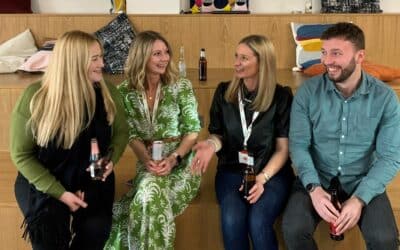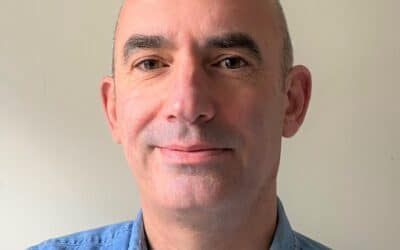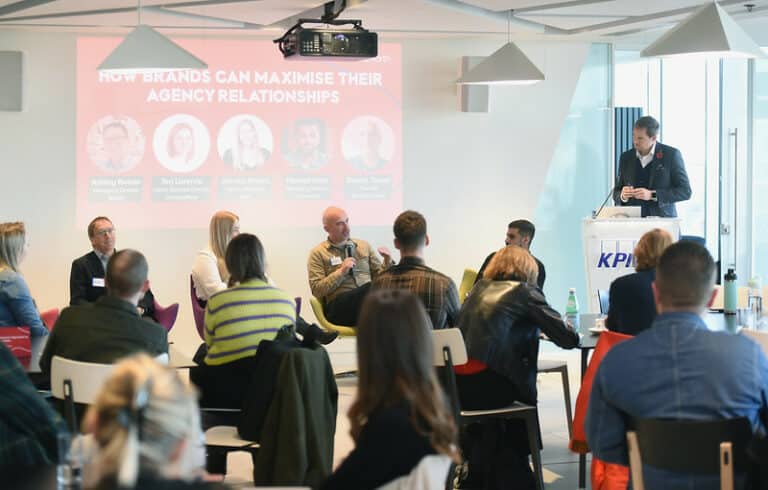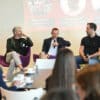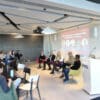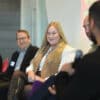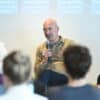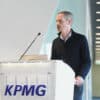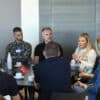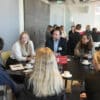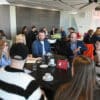Bollon started the session by explaining how Boutique initially works on uncovering data and insights to feed creativity, then working collaboratively with creative agencies to build a “stand out” project.
At No Brainer, Gary Jenkins said at the heart of the business is “creative intelligence”. He explained his agency operates in a similar way to Boutique, with insights and data on customer wants and needs fuelling the creative process.
“The longer we work with clients, the better the work we do together because we’re constantly learning and adapting from the work we do.”
For Gavin Shore at McCann Leeds, building the right environment is key for creativity. But where do great ideas come from?
“It’s about creating that environment to take the fear out of getting it wrong. Let’s try everything,” he said. “We like to involve media partners, we like to involve clients, we like to involve other partners to get to the core of what the idea is, what the behavior is, and where that can go.”
Those big brand ideas don’t happen straight away, encouraging staff to gather small ideas first can power creativity, he added.
Jenkins agreed, adding that by creating a culture that “strips out fear internally” it can boost creativity and encourage staff to be brave and throw their own ideas into the mix. “Great ideas can come from anywhere,” he said. “We have very different people in our business, not everyone is the same. And we celebrate that uniqueness and individuality.”
Using an example of Boutique’s work with pet brand Naturo, Bollon explained how the campaign was driven through data, facts and numbers to slot into the creative process. “It can and should really support creativity.”
For Shore, agencies should be “very mindful” of using data. Although it is critical, it should be used cautiously to inform a campaign as it could stifle originality with the results just repeating previous successes.
Bollon agreed, adding “sh*t hot creative has been lost a little bit”. Being brave and having creative courage are vital tools for creating those memorable campaigns.
Wrapping up the session, the panellists discussed the impact of tough economic times on creativity.
“I think there’s a certain locking down the hatches behaviour that brands and businesses need, but ultimately, your brand is still your brand, you still need to stand out, you still need to be relevant in people’s minds,” said Gavin Shore.
How brands can maximise agency relationships
Moving onto the second panel session on how brands can best maximise partnerships with agencies, five industry leaders took to the stage.
The panel included Ashley Bolser, MD of Bolser; Tori Lorence, Client Service Director at CreativeRace; Jessica Brown, Agency Partner at Awin; Hamad Mian, MD at Unbranded Manchester and Gareth Turner, founder of Big Black Door and former Head of Marketing at Weetabix.
Delving into his own research he carried out with Big Black Door, Gareth Turner explained how there were six key findings, one of which is that agencies and clients need to treat each other with more respect.
The “power of the brief and getting the brief right” is important for brands and agencies to have a successful relationship.
For Jessica Brown at Awin, the key to a successful relationship between brands and agencies is building that relationship. Whether it’s meeting up in person, going for dinner or drinks, it can help to spark creative ideas.
“Forming that bond is how you get to know how people want to work, how you can service them effectively, and also retain that relationship for a really long time.”
Being “more curious” whether it’s being able to talk about what’s been in the news lately or what you’ve seen at a latest exhibition is important to bring different perspectives too, explained Tori Lorence at CreativeRace.
“On top of that, understanding the brief and understanding the people behind it, also just layering in that element of thinking outside the box, and not looking at just what’s on paper for you. That comes from having a genuine level of curiosity in the world around you.”
Ashley Bolser agreed. Having curiosity, cementing relationships with clients to understand what their motivations are and respect are all important too.
Hamad explained how Unbranded starts off by being “honest with absolutely everything” with its clients to build that respect. “A lot of the time breaking down that barrier is one of the hardest things but once you have it, it’s easy to get whatever you want out of the client later on down the line.”
Reflecting on his career working at Weetabix, Gareth Turner explained how the brand had a “yes if” approach rather than a “no because” approach when it comes to creativity. For example, with the idea behind the ‘Beanz on Bix’ campaign, it was “yes, if you can show me it’s not going to damage our taste credentials. Yes, if it’s not going to cause us problems”.
Ultimately, the idea came from “strategy, mixed with a bit of bravery”.
In times of crisis, the best partnerships can be formed in the toughest times. Bolser was working with KFC when the company had run out of chicken in the UK, which led to some chicken loving customers even resorting to calling the police to show their dismay.
“We found out about this on a Friday and we were all in the pub,” explained Ashley Bolser. “It was an absolute disaster.”
Over the weekend, the agency pulled together to redo KFC’s website, showing the importance of partnerships. “We did that out of an understanding that this was a desperate time for our client and if we didn’t step up, if we didn’t do this work, they were going to be in even more trouble.”
For Tori at CreativeRace, going the extra mile for clients is not just about being there in moments of crisis but also being on top of trends and the competition. With clients such as Asda and Greggs, the agency works proactively to figure out what’s next for each brand.
“It is all about understanding that marketplace and helping them through whatever the peaks and troughs might be. It’s so unpredictable. That’s what makes this industry so fun.
Wrapping up the session, Gareth Turner discussed whether there is a lack of training brands give their teams in terms of working with agencies. When he moved into marketing in a former role at Heineken, he detailed how training was “proper investment” into him as a marketer which became very important for navigating agency and client partnerships.
Channel 4 and partnerships
Kevin Blacoe, Head of Partnerships and Skills at Channel 4, then took to the stage. Prior to joining Channel 4, he worked for 12 years at the BBC across London and Salford.
Following an overview of the work Channel 4 does both nationally and locally, he explained how partnerships are “embedded” in what the broadcaster does.
“For us, to have collaborations and partnerships is not just nice to have but a fundamental requirement for us to be able to deliver on our entire purpose.”
“We realised that if we genuinely wanted to be a UK wide broadcaster and have relevance for everybody, we couldn’t afford to have all of our decisions made by people sitting in the same office, sharing those same experiences. It wasn’t right for our business or for our content.”
It led to the creation of 4 All the UK strategy, with Channel 4 establishing Leeds as its national HQ and fostering a future “reflective of the whole nation, tapping into new skills, talent and capabilities from across the UK.”
“Critically, working in partnership is a thread that runs throughout all of our 4 All the UK strategy and has been crucial to its success. As a national broadcaster, we wanted to be more accessible across the UK and be open to working more collaboratively.”
From working in collaboration with local authorities, universities, regional creative companies, colleges and other broadcasters, partnerships support Channel 4 to deliver various training and skills opportunities.
“Working in partnership is really crucial to help what skills are delivered,” he explained. “I think everyone agrees that talent and skills is a major challenge within the UK creative industry and it would be a waste of our time and our money and our effort if we just duplicated things or work solely on our own needs.”
Roundtables
Attendees were then able to take part in one of five roundtable discussions around the theme of partnerships.
- Roundtable 1 – An Outcome Approach to Partnerships, hosted by Boutique
- Roundtable 2 – Securing Talent in the Current Market, hosted by Rosie MacPhail from Better Placed
- Roundtable 3 – Affiliate Partnerships, hosted by Jessica Brown from Awin
- Roundtable 4 – Digital PR, hosted by No Brainer
- Roundtable 5 – Leveraging Media Partnerships and Data, hosted by Mark Westaby from Metricomm
Key takeaways from No Brainer’s session delved into all things around digital PR. Attendees discussed their different perspectives on the definition of digital PR, ultimately agreeing that digital PR depends on the brief and desired outcomes as well as effective storytelling.
The roundtable agreed that digital PR was seen as an evolution of traditional PR that works in partnership with SEO to produce a desired outcome – whether that outcome is brand awareness or increase in sales.
Good PR should create stories around brands that target customers want to engage with, but in today’s media landscape there are so many different ways to reach customers in terms of content format and channels, meaning it can be even harder to cut through and connect. In-depth research on where target customers live online, their behaviours, wants and needs, as well as their behaviours and routines offline, is crucial to ensure stories resonate in the way agencies want them to.
For Awin’s roundtable discussion, the table discussed one of the biggest trends to follow Covid and lockdown has been the demand for affiliate activity across direct-to-consumer (D2C) and luxury brand activity. The need to market to consumers directly during retailer stock shortages and the uprise of influencer content playing a key part in this.
One of the key takeaways is that although not all brands and agencies are digitally developed, specialist affiliate and partner marketing training and support is available through tracking and affiliate management platforms such as Awin and dedicated performance agencies. If a brand doesn’t have in-house resource to commit to managing an affiliate programme, its best to be open and suggest out-sourcing to ensure the success of the channel.
During Boutique’s roundtable, attendees agreed that clients and agencies need to be more honest in collaboration.
It was discussed that agencies often focus too much on themselves, their services and making pitches work for them but clients and consultants see through this. Collaboration and partnership works where there is a focus on the clients needs, but a mutual respect to all parties and ensuring it works for everyone.
An interesting point was raised about motivations. Is the client looking for a promo, does the contact in the agency want to really own some amazing work, do partnering agencies want to work together in the hope they’ll refer work to each other in the future? This was discussed at length and it came back to relationships, closeness, understanding each other and not getting lost in the work straight away.


